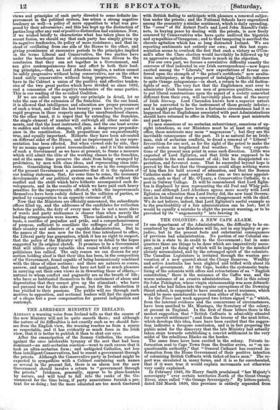• TIM ABERDEEN MINISTRY IN IRELAND
ALREADY a warning voice from Ireland tells us that the course of the new Ministry will not be quite smooth there; and although the nature of its difficulties is not exactly such as we should fore- see from the English view' the warning reaches us from a source so respectable, and it has evidently so much force in the Irish -view, that it is better to publish it than to skit our eyes. After the emancipation of the Roman Catholics, the reaction against the once intolerable tyranny of the sect that had been dominant—an anti-sectarian reaction—went to such excess that it took an ultra-sectarian form ; and nnbigoted Catholics, not less than intelligent Conservatives, had to resent a government through the priests. Although the Conservative party in Ireland might be expected to sympathize with a Cabinet containing such names as several in the present list, there is an alarm lest the new Government should involve a return to "government through the priests." Irishmen, generally, appear to be place-hunters by nature, and will tend to fall into the ranks of the Go- vernment for the time being, if party associations furnish a pre- text for so doing ; but the more educated are too much tinctured
with British feeling to anticipate with pleasure a renewed subjec- tion under the priests ; and the National Schools have engendered among the peasantry a similar sentiment, which is daily spreading. The " error ' of Sir Robert Peel's and Lord Sohn Russell's Cabi- nets, in buying peace by dealing with the priests, is now freely censured. by Conservatives who have quite outlived the bigotries and sympathies of Orangeism ; and to that tampering is ascribed the chronic agitation which has so long distracted Ireland. We are reporting sentiments not entirely our own; and this last repre- sentation seems to overlook the fact that such a victory as O'Con- nell's after the Clare election would inevitably be followed up by an aggressive agitation. Still there is much in the objection.
For our own part, we foresee a correlative difficulty exactly the converse of that indicated in our Irish correspondence—new hopes excited among the "Liberals," new expectations of favour con- ferred upon the strength of "the priest's certificate," new exalta- tions anticipatory, at the prospect of indulging Catholic influence to spite Orange antagonisms—in short, a return to the old faction- fights of sect. The very fact that the Englishmen sent over to administer Irish business are men of generous qualities, anxious to put liberal constructions upon the aspect of a society somewhat different from their own, will inevitably place them at the mercy of Irish blarney. Lord Clarendon knows how a superior nature may be converted to be the instrument of those grossly inferior ; and it might perhaps have been a fortunate circumstance had it so happened that no Englishman associated with past Administrations should have returned to office in Dublin, to renew past mistrusts and past hopes.
To men conscious of no sectarian subserviency, conscious of up- right intentions, as our Ministers must be at least on entering office, these mistrusts may seem " ungenerous "; but they are the inevitable consequence of the past. It is as natural for an Irish- man, sick of sectarian conflicts, to dread a renewal of " Liberal " favouritism for one sect, as for the sight of the petrel to make the sailor reckon on lengthened foul weather. The very expecta- tions of the present men point in some such direction. Little was expected of Lord Eglinton; and that little was supposed to be favourable to the seat dominant of old ; but he disappointed ex- pectation, and favoured none. That he succeeded beyond hope is proved by the fact that the Orangemen could allege nothing worse of him than his bold avowal of education, and that the Roman Catholics make a great outcry about one or two minor appoint- ments, such as that of Mr. O'Leary, a Conservative Catholic, to a post in Galway College. It will be remembered that Lord Eglin- ton is displaced by men representing the old Peel and Whig poli- tics; and although Lord Aberdeen agrees more nearly with Lord Eglinton on education than Lord Derby did, the new local Govern- ment in Ireland may show a converse disagreement with its chief. We do not believe, indeed, that Lord Eglinton's useful example as to the practicability of a fair administration can be lost; but it would be equally a mistake to slight the present warning, or to be provoked by its " ungenerosity " into braving it.
































 Previous page
Previous page